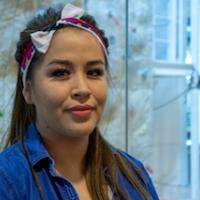Indigenous Studies
Credentials available
- Bachelor of Arts
- Bachelor of Arts & Science
- Bachelor of Arts / Bachelor of Education
- Bachelor of Arts / Bachelor of Laws
- Bachelor of Arts / Bachelor of Management
Campus
- Lethbridge
Intake
Program description
Indigenous studies explores art, law, philosophy, health, politics, history, gender studies, ecology, business, customs and language — all from a unique Indigenous perspective — making this one of the most sought-after programs of its kind in Canada.
In this program, you’ll have the opportunity to investigate First Nations’, Métis and Inuit (FNMI) history, heritage and culture, as well as the contemporary issues that face FNMI communities.
As a student of Indigenous Studies, you’ll have access to Indigenous instructors, who are often nationally or internationally renowned, seasoned professionals with real-world experience.
Indigenous Students' Union (ISU) | Indigenous Studies students have an active presence on campus through the ISU, which sponsors the annual Indigenous Awareness Days and various other community events.
Indigenous Awareness Days | This annual, week-long event consists of a series of free lectures, workshops and the celebration of Indigenous culture. Indigenous Awareness Days usually takes place in March.
Minors | Adding a minor to your degree is a great way to explore academic interests beyond your major. A minor is a set of courses comprising a secondary focus of interest generally not related to your major. A minor may be required or optional.
Honours thesis | If your GPA is high enough in your fourth year, you can opt to complete an undergraduate thesis course. This is an excellent opportunity for you to earn an “Honours Thesis” designation on your degree.
Experience learning | Our students have a number of experiential learning opportunities available to them including co-operative education, international exchanges, independent and applied studies as well as volunteer opportunities. uLethbridge is the only university in Alberta to offer co-operative education to all majors in the arts & sciences, at both the undergrad and grad level. Transfer students can head out on their first work term before ever stepping foot on campus! For example, many transfer students have completed a summer work term before starting classes in September.
Skills acquired | In addition to developing exceptional written and oral communication skills in the program, you will also develop your critical and analytical thinking skills, your information acquisition and management skills, as well as your attention to detail. These abilities are highly sought after and can be applied to practically any working scenario.
Possible careers
Related fields. There are numerous interesting career options open to Indigenous studies graduates, like:
- fine arts
- politics
- administration
- Native outreach work
- international affairs
- art history
- economics
- film
- human rights work
- social work
- Native issues lobbying
- governmental diplomacy
- historic site administration
- public relations
- art appraisal
- demography
- preservation planning
- civil service
- environmental history
- historical documentation
- historical film production
- historic foundation
- administration
- genealogy
- museum curation
- local government
- archaeology
- historical research
- creative writing
Professional disciplines & graduate studies. Your undergraduate degree in Indigenous Studies also provides an excellent foundation for law, management, journalism and education. The University of Lethbridge’s School of Graduate Studies offers graduate programs at the master's and doctoral levels spanning over 60 disciplines — so why not consider pursuing grad school right here in Lethbridge! Whether you choose to do your advanced studies at uLethbridge or another institution, know that your undergraduate degree has set you on the path to post-graduate success.
Admission requirements for Indigenous Studies
For admission, Canadian high school students in Alberta must have completed five of the following courses with a minimum 65% average across them:
This course is required:
- English Language Arts 30-1
Three of these courses are required:
- Aboriginal Studies 30
- Art 30 or Art 31
- Biology 30
- Chemistry 30
- Choral Music 30, General Music 30, or Instrumental Music 30
- Dance 35
- Drama 30
- Mathematics 30-1 or Mathematics 30-2
- Mathematics 31
- Physics 30
- Science 30
- Social Studies 30-1
- Five credits in Advanced-level CTS Computer Science (CSE)
- One or more distinct languages at the 30 level
One additional requirement from this list:
- That has not already been used
- May be from the list above
- Must be at the 30 level
- Must be worth at least five credits (multiple courses worth a total of five or more credits can be used)
- Cannot be a Special Project
Not a Canadian high school student in Alberta? Find your admission requirements here
First year cost estimator
for Indigenous Studies
Let us help you understand your tuition and fees for your first year at the University of Lethbridge.

Work in silence and let your success be your noise.
- Shay-Lynn, Indigenous Studies
Sample classes
Course selections for the program will vary, but may include:
- Introduction to Indigenous Studies
- Indigenous Art Studio
- Indigenous Histories of Canada
- Indigenous Peoples and Law
- The Métis
- Comparative Traditional Indigenous Economies
- Blackfoot & Cree Languages
